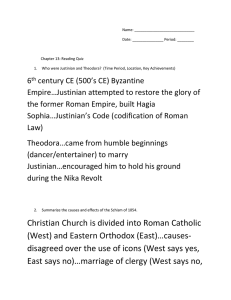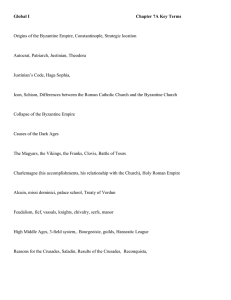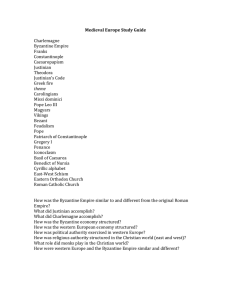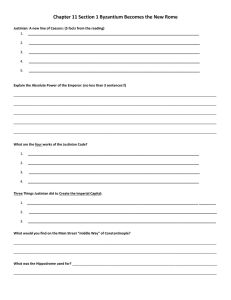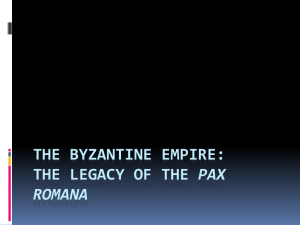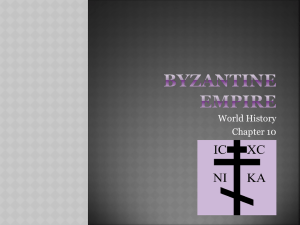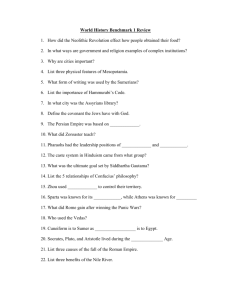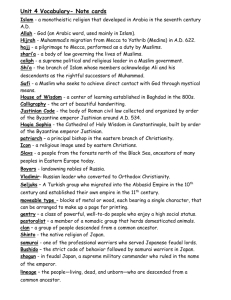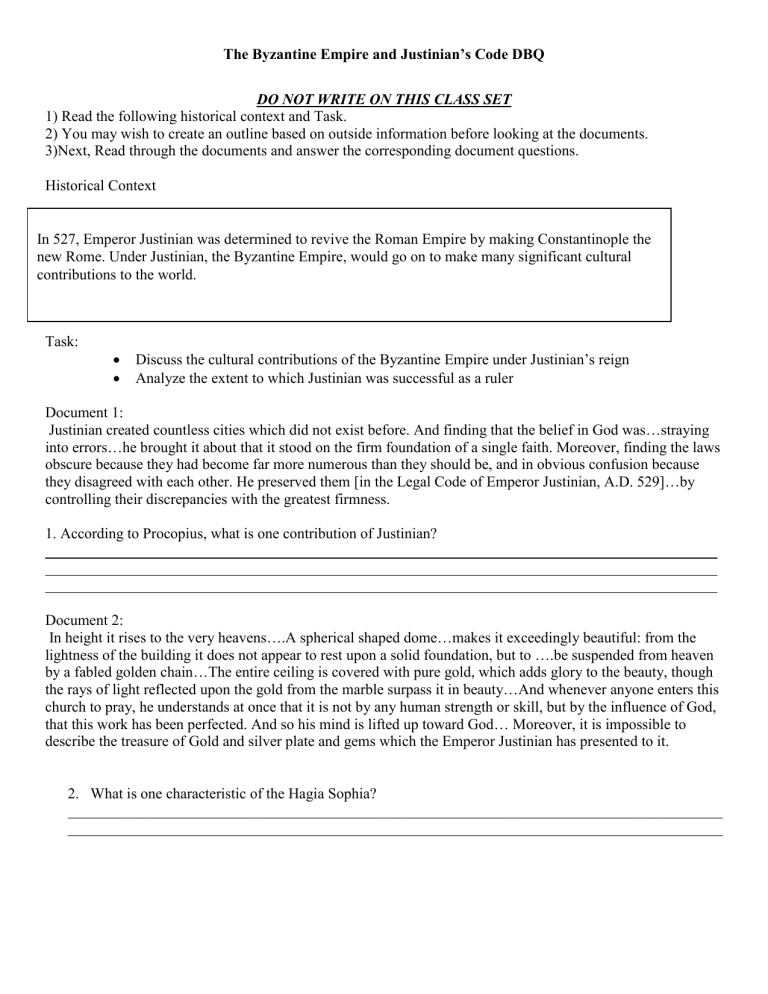
The Byzantine Empire and Justinian’s Code DBQ DO NOT WRITE ON THIS CLASS SET 1) Read the following historical context and Task. 2) You may wish to create an outline based on outside information before looking at the documents. 3)Next, Read through the documents and answer the corresponding document questions. Historical Context In 527, Emperor Justinian was determined to revive the Roman Empire by making Constantinople the new Rome. Under Justinian, the Byzantine Empire, would go on to make many significant cultural contributions to the world. Task: Discuss the cultural contributions of the Byzantine Empire under Justinian’s reign Analyze the extent to which Justinian was successful as a ruler Document 1: Justinian created countless cities which did not exist before. And finding that the belief in God was…straying into errors…he brought it about that it stood on the firm foundation of a single faith. Moreover, finding the laws obscure because they had become far more numerous than they should be, and in obvious confusion because they disagreed with each other. He preserved them [in the Legal Code of Emperor Justinian, A.D. 529]…by controlling their discrepancies with the greatest firmness. 1. According to Procopius, what is one contribution of Justinian? Document 2: In height it rises to the very heavens….A spherical shaped dome…makes it exceedingly beautiful: from the lightness of the building it does not appear to rest upon a solid foundation, but to ….be suspended from heaven by a fabled golden chain…The entire ceiling is covered with pure gold, which adds glory to the beauty, though the rays of light reflected upon the gold from the marble surpass it in beauty…And whenever anyone enters this church to pray, he understands at once that it is not by any human strength or skill, but by the influence of God, that this work has been perfected. And so his mind is lifted up toward God… Moreover, it is impossible to describe the treasure of Gold and silver plate and gems which the Emperor Justinian has presented to it. 2. What is one characteristic of the Hagia Sophia? _______________________________________________________________________________________ _______________________________________________________________________________________ The Byzantine Empire and Justinian’s Code DBQ Document 3: Below are excerpts from the Secret History by Procopius. “That Justinian was not a man, but a demon, as I have said, in human form, one might prove by considering the enormity of the evils he brought upon mankind. For in the monstrousness of his actions the power of a fiend is manifest. Certainly an accurate reckoning of all those whom he destroyed would be impossible, I think, for anyone but God to make. Sooner could one number, I fancy, the sands of the sea than the men this Emperor murdered. Examining the countries that he made desolate of inhabitants, I would say he slew a trillion people. For Libya [North Africa], vast as it is, he devastated…Yet still more numerous than these were the Mauretanians, who with their wives and children were all exterminated. And again, many Roman soldiers and those who followed them to Constantinople, the earth now covers; so that is one should venture to say that five million men perished in Libya alone…so that he might manage affairs there himself and be able to plunder the whole of Libya. Sending commissioners to value the province, he imposed grievous taxes where before there had been none. Whatever lands were most valuable, he seized, and prohibited the Arians from observing their religious ceremonies. Negligent toward sending necessary supplies to the soldiers, he was over strict with them in other ways; wherefore mutinies arose resulting in the deaths of many. For he was never able to abide by the established customs, but naturally threw everything into confusion and disturbance…So while he was Emperor, the whole earth ran red with…blood…” 3.What are two actions that Justinian took as ruler of the Byzantine Empire? a._________________________________________________________________________________ b._________________________________________________________________________________ Document 4: The Justinian code became the official body of laws of the Eastern Roman [Byzantine] Empire through the Middle Ages and was gradually reintroduced into Western Europe in the Twelfth century. Roman law continued in the post medieval world and formed the basis of all common law in some western lands. Below are some examples of Justinian’s code. No one suffers a penalty for merely thinking It is better to permit the crime of a guilty person to go unpunished than to condemn one who is innocent Proof is incumbent upon the party who affirms a fact not upon him who denies it The crime or the punishment of a father can place no stigma upon his son 4a. What is one impact of the Justinian code? ___________________________________________________________________________________ 4b. What is one characteristic of the Justinian code? ___________________________________________________________________________________ The Byzantine Empire and Justinian’s Code DBQ Document 5 5. What is one example of a building project that Justinian brought to Constantinople? ____________________________________________________________________________ _____________________________________________________________________________ Document 6 6. What is one area that was included in the Byzantine Empire? _____________________________________________________________________________________ The Byzantine Empire and Justinian’s Code DBQ Document 7: Whatever her origins, Theodora had the respect of her new husband. In 532, when two factions (known as the Blues and the Greens) threatened to end Justinian's rule, she is credited with getting Justinian and his generals and officials to stay in the city and take strong action to suppress the rebellion. Through her relationship with her husband, who seems to have treated her as his intellectual partner, Theodora had a real effect on the political decisions of the empire. Justinian writes, for instance, that he consulted Theodora when he promulgated a constitution which included reforms meant to end corruption by public officials. She is credited with influencing many other reforms, including some which expanded the rights of women in divorce and property ownership, forbid exposure of unwanted infants, gave mothers some guardianship rights over their children, and forbid the killing of a wife who committed adultery. She closed brothels and created convents where the ex-prostitutes could support themselves. – Johnson Lewis 7. What is one contribution that Justinian’s wife Theodora made to the Byzantine Empire? __________________________________________________________________________________________
